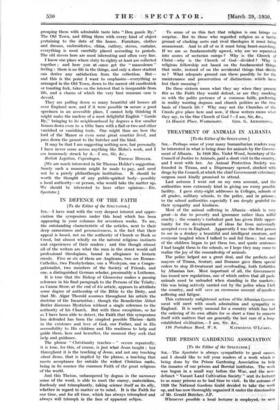IN DEFENCE OF THE FAITH
[To the Editor of the SPECTATOR.]
have read with the very deepest interest and appre- ciation the symposium under this head which has been appearing in your columns for seventeen weeks. To me, the outstanding characteristic of the articles, next to their deep earnestness and persuasiveness, is the fact that their appeal is based, not on the authority of Church or Book or Creed, but almost wholly on the natural religious instincts and experiences of their readers ; and this though almost all of the writers are what the man in the street would call professional theologians, bound in allegiance to historic ereeds. Five or six of them are Anglicans, two are Roman- Catholics, two Presbyterians, one a Wesleyan, one a Congre- gationalist, two members of the Society of Friends, and one, a distinguished German scholar, presumably a Lutheran.
It is true that the Bishop of Gloucester makes a passing reference in his final paragraph to the Persons of the Trinity, as Canon Storr, at the end of his article, appears to attribute some degree of authorship -of the Bible to the Deity, and that Mr. Algar Thorold assumes throughout his article the doctrine of the Incarnation ; though the. Benedictine Abbot Butler discusses Mysticism without a single reference to the authority of his Church. But with these exceptions, so far as I have been able to detect, the Faith that this symposium has defended has been the simplest possible -Theism—faith in the existence and love of God, our Father, and in His accessibility to His children and His readiness to help and guide them, here and hereafter, the moment they seek that help and guidance.
The phrase " Christianity teaches— " occurs repeatedly, it is true, for this, of course, is just what Jesus taught ; but throvghout it is the teaching of Jesus, and not any teaching about Jesus, that is implied by the phrase, a teaching that meets acceptance far outside the widest Christian ranks, being in its essence the common Faith of the great religions of the world.
And this Theism, unhampered by dogma in the narrower sense of the word, is able to meet the enemy, materialism, fearlessly and triumphantly, taking science itself as its ally, whether in regard to matter or to mind. It is the Faith for our time, and for all time, which has always triumphed and always will triumph in the face of apparent eclipse.
- To -some of us this fact that religion is one brings no surprise. But to those who regarded religion as a battle ground of clashing sects and rival theologies it must bring amazement. And to all of us it must bring heart-searching. If we are so fundamentally agreed, why are we separated into scores of sectarian camps ? Why •is the Church of Christ—why is the Church of • God—divided ? Why is religious fellowship not based on the fundamental things that unite, instead of on the accidental things that divide us ? What adequate ground can there_ possibly_ be for the maintenance and preservation of distinctions which' have
lost their meaning ? -- - Do these sixteen mean what they say when they -piesent this as the Faith they would defend, or are they mocking us with the polite pretence of a common faith, .preferring in reality warring dogmas and church politics as the true basis of Church life ? Why may not -the Churches of the Creeds give place here and now, if these writers mean what they say, to the One Church of God ?—I am, Sir, &c.,
14 Howick Place, Westminster. GEO. G. ARMSTRONG.














































 Previous page
Previous page